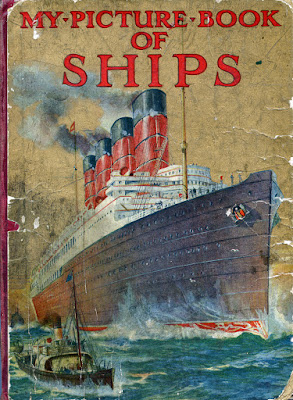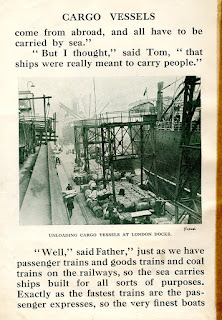On the bottom shelf of my dad’s bookcase were some of his childhood books. He was nearly as daft as me for keeping things. There might have been many more treasures but for mum’s propensity for throwing things away, although the bookcase was sacrosanct, even to her.
I always knew he had them, of course, but never took the time for anything more than a superficial glance at the pictures. He must have treasured them greatly. All have his name and address inside and some also the date.
The earliest and most dilapidated is My Picture Book of Ships which he got in 1926 at the age of five. To a child at that time the cover must have looked thrilling: the vast bulk of the ocean liner soaring proud above the waterline, the towering hull and funnels, the dense spray from the bow-wave hinting at the rumbling power of the great engines and propellers, the huge anchor tight against the ship’s side. People yearned to travel in the luxury of these floating palaces. They were the dream machines of their day: the supersonic jets, the Lamborghinis, the spaceliners, the high speed trains, the earth moving machines, the ice road truckers. Even their names implied substance and opulence: Majestic, Britannic, Olympic, Leviathan, Edinburgh Castle.
We used to look at it together when I was little. We studied the sixty-two illustrations but never read it. The text tells of two children, Tom and Betty, who ceaselessly ask Father questions about ships. They also play at ships: Tom is Captain and Father the pilot, while Chief Officer Mother sleeps “on watch” below and poor Petty Officer Betty gets ordered around.
Father of course answers all their questions patiently, knowledgeably, and at length. He tells them about how the voyage of an ocean liner is organized, how sailors are trained, shipbuilding, shipwrecks, coal and oil power, sail, cargo vessels, lifeboats, lighthouses and lightships, paddle steamers, and ferries. How he knew all this stuff is not clear. He just did. Perhaps he was a seaman himself, or maybe like my own dad his grandfather had been a Captain and his cousin was at sea. Oh yes, all dads knew everything there was to know about ships; especially when they had grown up in a Yorkshire port.
Dads could describe and explain all the pictures: cargo being unloaded at London docks, the Harwich-Zeebrugge railway ferry with wagons on board, a big ship under construction inside a massive gantry, and boys lining a high mast at a sailors’ training school. I certainly would not have wanted to have been the baby thrown through the air to a lifeboat in a rescue at sea. My dad used to pick me up and pretend to act it out.
But that is not what used to frighten me most. I was terrified of the strange double-page cartoons inside the front and back covers. Why a factual book about ships should contain such irreverent drawings is a mystery. They are not even proper ships. They show traumatised people in canoes, punts and rowing boats on an overcrowded river, being attacked by pigs, cows and swans, knocked overboard by clumsy oarsmen or tormented by badly controlled fishing lines. They all have ugly ears, gaping mouths and grotesque faces. I could never bear to look. It is still difficult now.
As Nick Ross used to say: “Don’t have nightmares. Do sleep well.”
My Picture Book of Ships published by Ward Lock & Co. (c1922) is believed to be out of copyright.
I always knew he had them, of course, but never took the time for anything more than a superficial glance at the pictures. He must have treasured them greatly. All have his name and address inside and some also the date.
The earliest and most dilapidated is My Picture Book of Ships which he got in 1926 at the age of five. To a child at that time the cover must have looked thrilling: the vast bulk of the ocean liner soaring proud above the waterline, the towering hull and funnels, the dense spray from the bow-wave hinting at the rumbling power of the great engines and propellers, the huge anchor tight against the ship’s side. People yearned to travel in the luxury of these floating palaces. They were the dream machines of their day: the supersonic jets, the Lamborghinis, the spaceliners, the high speed trains, the earth moving machines, the ice road truckers. Even their names implied substance and opulence: Majestic, Britannic, Olympic, Leviathan, Edinburgh Castle.
We used to look at it together when I was little. We studied the sixty-two illustrations but never read it. The text tells of two children, Tom and Betty, who ceaselessly ask Father questions about ships. They also play at ships: Tom is Captain and Father the pilot, while Chief Officer Mother sleeps “on watch” below and poor Petty Officer Betty gets ordered around.
Father of course answers all their questions patiently, knowledgeably, and at length. He tells them about how the voyage of an ocean liner is organized, how sailors are trained, shipbuilding, shipwrecks, coal and oil power, sail, cargo vessels, lifeboats, lighthouses and lightships, paddle steamers, and ferries. How he knew all this stuff is not clear. He just did. Perhaps he was a seaman himself, or maybe like my own dad his grandfather had been a Captain and his cousin was at sea. Oh yes, all dads knew everything there was to know about ships; especially when they had grown up in a Yorkshire port.
Dads could describe and explain all the pictures: cargo being unloaded at London docks, the Harwich-Zeebrugge railway ferry with wagons on board, a big ship under construction inside a massive gantry, and boys lining a high mast at a sailors’ training school. I certainly would not have wanted to have been the baby thrown through the air to a lifeboat in a rescue at sea. My dad used to pick me up and pretend to act it out.
But that is not what used to frighten me most. I was terrified of the strange double-page cartoons inside the front and back covers. Why a factual book about ships should contain such irreverent drawings is a mystery. They are not even proper ships. They show traumatised people in canoes, punts and rowing boats on an overcrowded river, being attacked by pigs, cows and swans, knocked overboard by clumsy oarsmen or tormented by badly controlled fishing lines. They all have ugly ears, gaping mouths and grotesque faces. I could never bear to look. It is still difficult now.
As Nick Ross used to say: “Don’t have nightmares. Do sleep well.”
My Picture Book of Ships published by Ward Lock & Co. (c1922) is believed to be out of copyright.











What a lovely book. I do like the grotesque cartoons too, they're right up my street!
ReplyDeleteI find the strangest thing about the cartoons is how grotesquely at odds they are with the main content of the book.
DeleteIt reminds me of the artwork of Japan the grotesque fiends, devils and bad gods. But the children's books are a reminder of how life was looked at in that time. I think I must have come in when the great ships were plying their passengers to America - Queen Elizabeth and Queen Mary. The great luxury liners, different ones round today.
ReplyDeleteI followed the Queen Mary in a smaller boat as she sailed down Southampton Water. We were soon left trailing behind. See here: https://taskerdunham.blogspot.com/2021/11/new-month-old-post-day-we-saw-queen.html I see you commented on that post.
DeleteI rather like those cartoon sketches. They made me smile.
ReplyDeleteI think they are grotesque.
DeleteThe cartoons look like authentic snapshots of life at Barmby Marsh where my family lived in the three years before I was born. My brother Robin was born in Goole which I may have told you before.
ReplyDeleteGoole Maternity Home presumably. Good pedigree. The river at Barmby is not so calm, but the Kings Head pub used to be great for a game of darts and after-hours drinking. Tricky drive back on that windy road, though. Just think, had things been different you might have gone to Goole Grammar School.
DeleteYou would have probably bullied me and made me your fag.
DeleteThe cartoons are horrible! I really wonder whether they were originally intended to go into the book or it may have been a misprint.
ReplyDeleteBooks like that, especially when we look at them at an early age with our parents, stay with us forever. I have recently started to re-buy some old children's books which my sister and I had and loved when we were little, but somehow did not survive several moves and finally moving out from the family home to our own places. There are only a handful I really want to have again (and which were lost over time - I still have most of my childhood books), but when I manage to find one and have it sent to me, I get tearful when my happy childhood suddenly feels so close again.
I have some books I re-acquired, too. They bring things back quite powerfully.
DeleteDid such pictures 'do you head in' into adult years? I think not. There were some horrific stories we heard or read in our very young years and I don't think they had any lasting effect on us at all.
ReplyDeleteYour father sounds like he was a caring man who wanted to instil knowledge to his son. That's a nice thing.
I think he loved to play and be silly. My own children miss him very much.
DeleteThat is a splendid book. The cover illustration transports one to an earlier age, one that seems as if it were kinder, gentler - I don't think it was, though - just simpler. Life has always been unkind to some.
ReplyDeleteIt was certainly simpler, and more leisurely too, before everything became financially "efficient".
DeleteChildhood books are often treasured friends, aren't they.
ReplyDeleteMy dad kept this one, so it must have been a favourite. It shows its age, though.
DeleteAre you bit of a Womble like me Tasker? I have lots and lots of book that I haven't got the heart to give away.
ReplyDeleteI'm the same, but have been quite hard in recent years since becoming ill. The criterion is "will anyone else read this? If not it has now gone. I've photographed the covers.
DeleteI have some old 'Fortune' magazines from the '20s. The advertising is what catches our attention. Round the world trips offered on those great ships, luxury promised, for $2000, give or take. Can you imagine? I just looked it up. Viking offers a world cruise, 138 days, 28 countries, starting at $59,995. I'm going to get my pennies out and start counting, by golly.
ReplyDeleteYes, I've found a lot of interest in old advertising. I knew someone who was involved in an early digitising project in the 1990s, and said everyone was surprised that it was the ads that were of most interest, not the content.
DeleteTourism has become a bit of a racket.
lovely memories for you and special to have your dad's writing in the book and the date to give it some context...... thanks for sharing these pics - very interesting and i agree..... i don't like the end illustrations
ReplyDeleteIt seems some like the end pictures and some don't. They seem very out of place, either way.
DeleteI remember (and commented) on your post about the Queen Mary. Your father's book brings back fond memories for me of the beautiful ships like the QM and the SS United States.
ReplyDelete